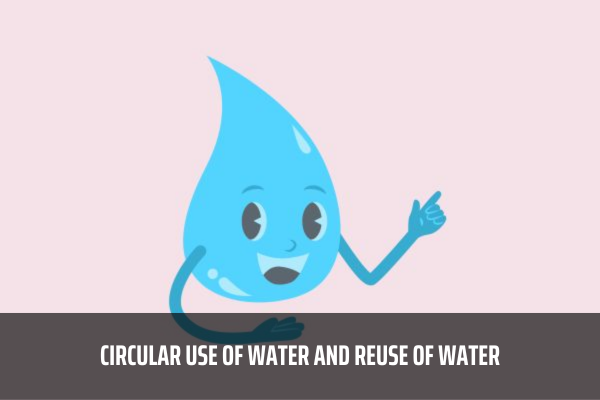What are the regulations on circular use of water and reuse of water in Vietnam under the Law on Water Resources 2023?
What are the regulations on circular use of water and reuse of water in Vietnam under the Law on Water Resources 2023?
Pursuant to the provisions of Article 59 of the Law on Water Resources 2023, there are regulations on the circular use of water and reuse of water as follows:
- The State encourages projects on investment in production, business and services involving the exploitation and use of water, and discharge of wastewater to adopt solutions for circular use of water and reuse of water immediately during the phase of setting up the projects.
- The treatment of wastewater and reuse of water shall comply with regulations of law on environmental protection.
- For projects on investment in production, business and services involving the exploitation and use of water, and discharge of wastewater in areas with surface water sources having reached their carrying capacity as announced by a competent authority, there must be solutions for circular use of water or reuse of water or a plan to treat wastewater in accordance with environmental technical regulation on surface water quality before being discharged to water sources as per regulations of law on environmental protection.
- Depending on the local socio - economic development conditions, the provincial People's Committee shall formulate a plan and roadmap for stipulating types of projects for which solutions for circular use of water and reuse of water are required with respect to the projects in areas frequently hit by droughts and water scarcity frequently occur, and determine the incentives to which those projects are entitled according to regulations of law.
- Projects on investment in production, business and services which adopt solutions for circular use of water and reuse of water may be receive a reduction in the fee for water resource exploitation right as prescribed by this Law.
- Organizations and individuals seeking and applying solutions for circular use of water and reuse of water in areas where water sources are deteriorated, groundwater exploitation threshold is exceeded and water sources have reached their carrying capacity.

What are the regulations on circular use of water and reuse of water in Vietnam under the Law on Water Resources 2023?
What are the incentives for reuse, cyclic use of water in Vietnam?
Pursuant to the provisions of Article 7 of Decree 54/2015/ND-CP, the incentives for reuse, cyclic use of water are as follows:
Reuse, cyclic use of water which is eligible for incentives include:
- Organizations construct or renovate, upgrade waste water collection and treatment work items with the scale of 40 m3 / day or more, meeting the national technical standards for water quality, in accordance with the purpose of re-use, and use such water amount for at least 80% of their activities;
- Organizations construct or renovate, upgrade, invest in-depth work items in order to use water cyclically for their activities at least 500 m3 / day, excluding cyclic water use for cooling and other cyclic forms under production process, technology;
- Organizations that manage and develop the hydraulic works renovate and repair items of the hydraulic work systems in order to use recurrently at least 15% of water amount supplied to the system within the hydraulic work system
Types of incentives:
(1) Borrowing incentive capital under the provisions of law on investment credit of the State
(2) Exemption or reduction of corporate income tax in accordance with regulations of law on taxation.
What are 10 prohibited acts related to water resources in Vietnam under the Law on Water Resources 2023?
Pursuant to the provisions of Article 8 of the Law on Water Resources 2023, 10 prohibited acts related to water resources are as follows:
(1) Dumping wastes and garbage, dumping or leaking hazardous substances or discharging hazardous emissions into water sources.
(2) Discharging wastewater into groundwater sources; discharging wastewater that has yet to be treated in accordance with environmental technical regulation on wastewater into surface water sources and seawater.
(3) Discharging wastewater and introducing wastes into domestic water safeguard zones.
(4) Illegally exploring, exploiting and using water resources, practicing groundwater drilling.
(5) Encroaching on rivers, streams, canals or ditches or carrying out river, stream, ditch or channel reclamation, unless otherwise prescribed by law; placing obstructions or obstacles, building architectures or planting trees, thus hindering flood drainage and water flow of rivers, streams, reservoirs, canals or ditches but taking no remedial measures.
(6) Illegally exploiting sand, gravel, sludge, soil and other types of minerals in rivers, streams, canals, ditches or lakes within water source protection corridors; carrying out drilling or digging operations, building houses, architectural objects or conducting within water source protection corridors, thereby resulting in river, stream, canal, ditch or lake bank erosion.
(7) Destroying facilities intended for protection, regulation or storage of water, exploitation, use, monitoring and surveillance of water resources, facilities intended prevention of, response to and recovery from damage caused by water.
(8) Falsifying information and data on water resources.
(9) Failure to comply with procedures for operating reservoirs and inter-reservoirs promulgated by competent authorities.
(10) Building dams, reservoirs or facilities for water regulation or storage or water source development in contravention of water resource-related planning, provincial planning and other relevant planning.
The Law on Water Resources 2023 comes into force from July 1, 2024, except for the cases specified in Clauses 3 and 4, Article 85 of the Law on Water Resources 2023.
LawNet